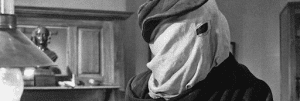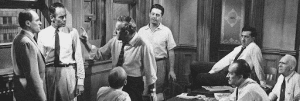As so much of the daily human experience is shaped and affected by either deference for or indifference toward the dignity of individual human life, so are there many films brimming with this heavy but important theme. The approaches are as varying as the topic suggests: the futility of war and the illusion of prejudices and arbitrary divisions; the impact one life has on so many others; the lengths to which we should strive to protect innocent life; the heavy burden that must be shouldered when dealing in matters of life and death and so on.
Presented here are five films that, each in their own way, call to mind on scales as small as a young child and as large as a global war the great importance of respecting the inviolability of each and every human life.

The Elephant Man (1980)
Directed by David Lynch • Starring Anthony Hopkins • John Hurt • Anne Bancroft
Based on the true story of severely deformed outcast Joseph Merrick, The Elephant Man is an empathetic chronicle of one man’s journey from the carnival freak show circuit to the high society of Victorian-era London. The experience is facilitated by compassionate surgeon Frederick Treves (Anthony Hopkins), who rescues Merrick from his carnival overseer and strives to provide the young pariah with a dignified and comfortable life. Though his treatment of Merrick appears to be imbued with genuine charity, the question festers as to whether Merrick’s elevation to the upper class is little more than a refined reworking of his former state. Can someone with such extreme deformities ever be truly assimilated into general society?
Merrick himself — portrayed by John Hurt in an incredible performance from beneath a mountain of prosthetics — is the least anxious over this question. Despite having been removed from the streets, the young man cannot find reprieve from moments of incredible cruelty and abuse. Yet, he accepts all this with quiet forbearance, calling to mind the Freak from Flannery O’Connor’s A Temple of the Holy Ghost who, with firm assurance of its own human dignity, proclaims to the crowd of gawkers: “God made me thisaway and I don’t dispute hit … I am a temple of the Holy Ghost.” In the tale of John Merrick, the most notable parallel to O’Connor’s freak comes after an intense chase through a rail station by a mob of people, at the end of which Merrick is unmasked. “I am not an animal!” he cries. “I am a human being! I…am…a…man!”
For all of its faults — it can be a bit sentimental — the film’s greatness is found in its steady and slow examination of the experience of life for one who only asks to be acknowledged for all that he has — his human dignity.
Runtime: 2hr 4min
Recommended ages: Teens and up

La vita è bella (1997)
Directed by Roberto Benigni • Starring Roberto Benigni • Nicoletta Braschi • Giorgio Cantarini
Roberto Benigni’s strikingly beautiful and undeniably funny La vita è bella is a deftly-mixed blend of the most extreme ends of “tragedy” and “comedy,” showcasing the lengths to which a man will go for those he loves, even in the face of abject horror. Beginning in Italy in 1939, the first half of the film treats us to the joyous courtship of Guido Orefice (portrayed by Begnigni himself) and the pretty schoolteacher Dora (Benigni’s real wife Nicoletta Braschi), establishing in no uncertain terms Guido’s insatiable charm, mastery of improvisation and zest for life. Whether it involves the treatment of a bee-sting on the thigh, conjuring the “key to Dora’s heart”, or a dry hat at the right time, Guido’s Chaplin-esque joie de vivre permeates the beginning of the film. Unknowingly, this serves to prepare Guido — and the audience as well — for the sharp turn taken in the second half of the film, which flashes forward six years to the near-end of World War II. Here Guido, now married to Dora and father to a young son, leans on his instinctive humor and spontaneity not merely for the sake of a laugh or as a means of wooing a young lady, but as a necessary means of protecting his child from the nightmares they now face. Robbed of everything but the perilous task of guarding his son, Guido risks any level of danger to protect his child’s sacred innocence, wholly emptying himself of the only gift at his disposal in the face of the most extreme of evils.
Runtime: 1hr 56min
Recommended ages: Teens and up
**Italian with English subtitles

It’s a Wonderful Life (1946)
Directed by Frank Capra • Starring James Stewart • Donna Reed • Lionel Barrymore
Perhaps the clearest choice for a list on the sanctity of life, Frank Capra’s perennial favorite It’s a Wonderful Life is as much about the sanctity of one individual human life as it is about those lives whose very realities are shaped by the existence (or non-existence) of the former. To exist is to be in community, a belief our protagonist George Bailey (the estimable James Stewart) bemoans as the root of his problems. Sure, but not this community. Visions of the Parthenon, the Colosseum and skyscrapers a hundred stories high have a hold of his head while his feet collect the dust of the crummy little town that he can’t seem to shake off. As a result, George’s nagging resentment of things undone obfuscates from himself the very real effect of his certain tendency to offer himself to the needs of those around him. His absence, as with the absence of any human life, is a hole in existence that requires an angelic being to even begin to understand its depths. The film demonstrates quite effectively that the utilitarian case for his existence is base level, as the iconic ending showcases George, children clinging to every part of him, being led down the stairs by his luminous and stalwart wife Mary (Donna Reed), who, throughout the entire film, has been the tether keeping George’s moon from drifting too far away in his own head. It is in the final shot, framing the little trinity of man, woman, and child, that George is most alive.
Runtime: 2hr 11min
Recommended ages: Kids and up

La Grande Illusion (1937)
Directed by Jean Renoir • Starring Jean Gabin • Pierre Fresnay • Erich von Stroheim
Widely considered one of the greatest films ever made, La Grande Illusion is many things: a war film without a single depiction of battle; an examination of a life slowly drained of meaning; a meditation on shifting world orders; and, perhaps most overarchingly, a critique of ideologies which seek to obscure and deny the universal bond of mankind. Set during the First World War (and released about two years prior to the beginning of the second), the film is primarily interested in human relationships and the extremes to which we allow prejudices or national boundaries to usurp the core tenant of shared human existence: that we are all created in the image and likeness of the same God. The film’s explorations of divisions in class, creed, race and national origin all point starkly to one end: the futility of war. And this is done in both mocking and somber examples. All of this gives way to a fourth act in which scenes of domesticity, fraternity and even the shared hope of the Nativity, cast heavy contrasts on the great illusion of war. Yet even here in this Edenic mountain homestead, the film laments, is found the stench of battle as we learn of the absence of several young men: German brothers and husbands who perished in some of the nation’s greatest wartime victories. Yes, they died in the glory of victory, but to what end? The film ponders this as it showcases the incredible emptiness at home arising from their untimely deaths. In watching La Grande Illusion, one cannot escape the desperate plea of filmmaker Jean Renoir — an appeal more distinctly potent given the 1937 release of the film and our knowledge of the global carnage soon to come — to expose the great illusion that is made manifest by the desecration of so much human life.
Runtime: 1hr 54min
Recommended ages: Teens and up
**French, German with English subtitles

12 Angry Men (1957)
Directed by Sidney Lumet • Starring Henry Fonda • Lee J. Cobb • Ed Begley
Taking place almost entirely within the confines of a small New York City jury room on the “hottest day of the year,” 12 Angry Men is the story of a dozen strangers tasked with deciding the fate of one young man. The beginning courtroom scene, capped by the judge perfunctorily instructing the jury of their civic duty, reeks of apathy, indicating a consensus: the accused, on trial for murdering his father and now potentially facing death row, is definitely guilty. “It’s an open and shut case,” declares one juror as the men enter the deliberation room; another makes sure to note he has a baseball game he does not want to be late for. But when all but one juror turns in a vote of “guilty”, the already small and uncomfortable room, which till that point had been placated with the anticipation of “getting this thing over with”, is quickly agitated, and all by a simple question: what if the young man is innocent? Thus begins a series of confrontations and ever-mounting tension as Juror 8 (Henry Fonda) works tirelessly to force his peers to do one simple thing: treat their task with the incredible weight and consideration of which the dignity of human life is deserving. Largely considered one of the great films of the past half century, this taut and compelling drama sharply challenges any trace of indifference in matters of life and death.
Runtime: 1hr 36min
Recommended ages: Kids and up
